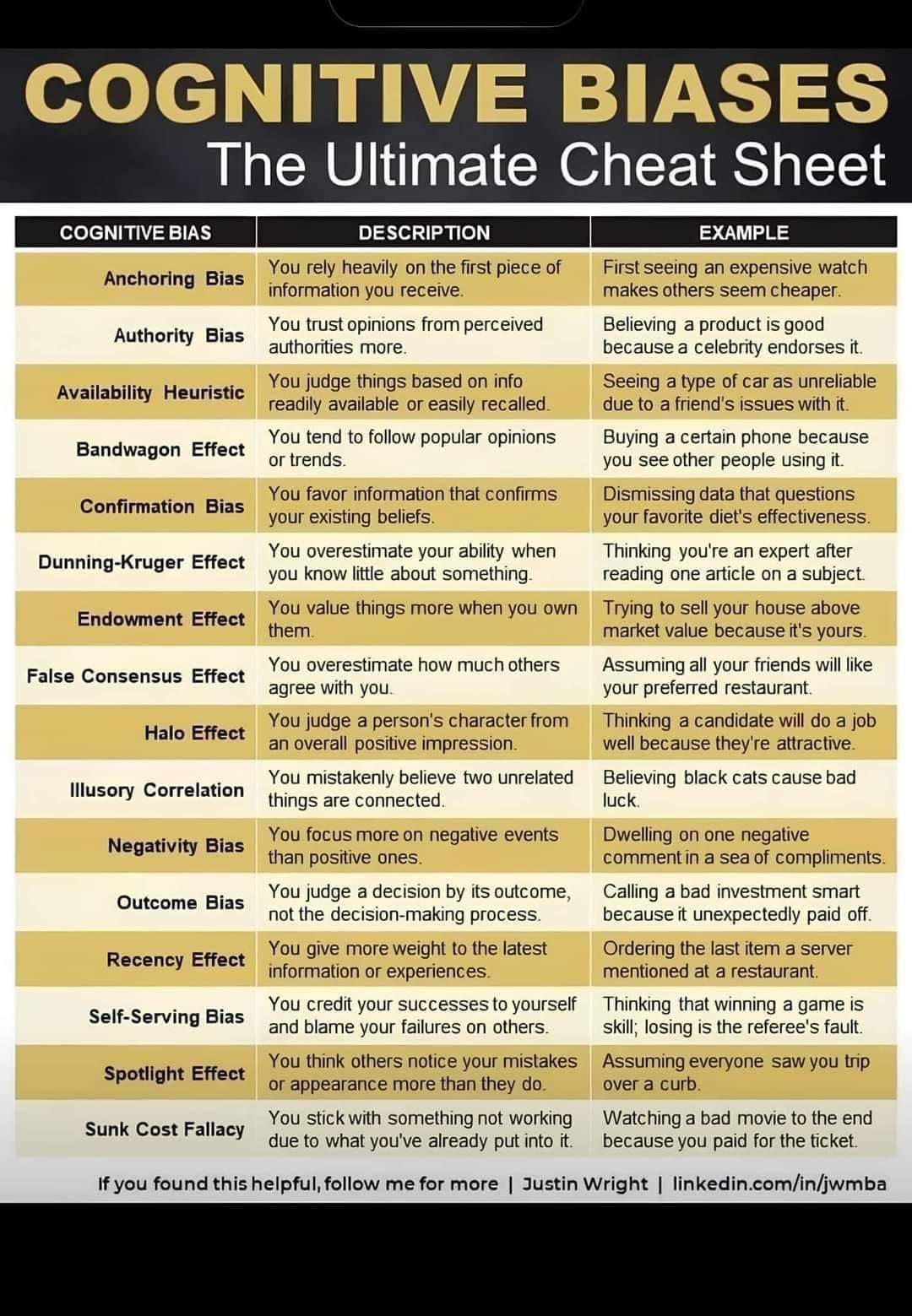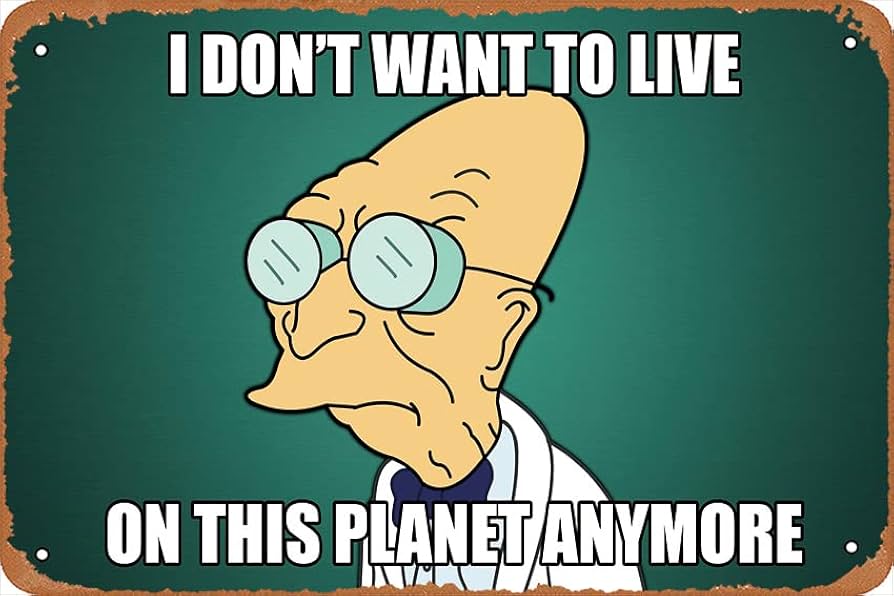I have a strong coherence bias. The less coherent a person, the less believable they seem.
Science Memes
Welcome to c/science_memes @ Mander.xyz!
A place for majestic STEMLORD peacocking, as well as memes about the realities of working in a lab.

Rules
- Don't throw mud. Behave like an intellectual and remember the human.
- Keep it rooted (on topic).
- No spam.
- Infographics welcome, get schooled.
This is a science community. We use the Dawkins definition of meme.
Research Committee
Other Mander Communities
Science and Research
Biology and Life Sciences
- [email protected]
- [email protected]
- [email protected]
- [email protected]
- [email protected]
- [email protected]
- [email protected]
- [email protected]
- [email protected]
- [email protected]
- [email protected]
- [email protected]
- [email protected]
- [email protected]
- [email protected]
- [email protected]
- [email protected]
- [email protected]
- [email protected]
- [email protected]
- [email protected]
- [email protected]
- [email protected]
- [email protected]
- !reptiles and [email protected]
Physical Sciences
- [email protected]
- [email protected]
- [email protected]
- [email protected]
- [email protected]
- [email protected]
- [email protected]
- [email protected]
- [email protected]
Humanities and Social Sciences
Practical and Applied Sciences
- !exercise-and [email protected]
- [email protected]
- !self [email protected]
- [email protected]
- [email protected]
- [email protected]
Memes
Miscellaneous
I’d love to see a list of names for writing devices used by trolls/propagandists thar generate completely false information of varying types. Forced binary choices when a third way is valid or the choices aren’t even related. Most of them are just plain old lies, so I don’t think the list would be too long.
Ahh negativity bias, my other middle name.
:P
Is there a "positivity bias" counterpart to "negativity bias"?
I'd argue that's the outcome or survivorship bias, where people focus on the one winner or that time a thing worked and ignoring all the other failures. E.g. people think investors all swim in money because they only see the warren buffets of the world, when in reality there's thousands, millions of people who tried the almost exact same thing and lost some or all of their savings in bad investments.
Absolutely! It's called the Pollyanna Principle. In fact, there's a counterpart to all of these biases that are immensely helpful in certain types of therapy.
For negativity bias my wife just told me a great technique that she uses for that. Come up with a list of people whose opinions matter to you. Any time you question yourself, imagine how each person on that list would react to what you did. Since those are the only people whose opinions matter to you, if it's mostly positive, then you should feel proud of your choice.
What's interesting is how, even when knowing these biases, one has a tendency to often have and display at least some of them.
(At least, that's the case for me)
Knowing these helps with self-talk. You trip over a curb and start scolding yourself. Then you can say to yourself "this is just spotlight bias", and move on with your day, avoiding the impact of negative emotions. Or, you might be more open to a change in restaurant plans because you know of the false consensus effect. There's subtle but real power in just naming things!
I tripped and fell spectacularly walking in a supermarket. I was annoyed that no one helped me up or checked if I was okay (I didn't need help but it made me think less of my fellow man) and that my partner was waiting in the car and didn't witness it, because it was actually really funny.
I left embarrassment in my 20s. Don't have the energy or interest in it now. And I know I'm not the main character - everyone's living their own lives, the impact you make on strangers is minimal. At worst someone said when they got home from the shops 'i saw this chick stack and it was kinda funny'.
Reminding yourself that no one really cares about people that don't know is a helpful way to shut down the negative self talk.
How to develop the mental discipline to jump to naming the bias in emotional situations like that though??
Repetition.
That's a good point.
Ever since I've became more aware of those I've found myself doing similar kind of "disarming" of such falacies when I notice I'm using them.
My point it's that it generally feels like swimming against the current.
You're absolutely right there. We're hard wired to think this way and it's a constant battle.
I'm out here actively going against my biases and selling someone else's house above market value 😤
Availability Heuristic looks out of place. It's pretty much the only bias I have (beside confirmation bias, which is hard to avoid as sneaky it is), but how should one survive in this world without relying on others? Without doing a scientific bias free study on every topic in life, you're unavoidable suffering from that bias. A healthy level would be avoiding making it a rule. I regularly disagree with friends decisions, so maybe I don't have this bias.
I'd say a lot of those things are the result of cognitive shortcuts.
It kinda makes sense to make a lot if not most decisions by relying of such shortcuts (hands up anybody who whilst not having a skin problem will seek peer-reviewed studies when chosing what kind of soap to buy) because they reduce the time and energy expediture, sometimes massivelly so.
Personally I try to "balance" shortcuts vs actual research (in a day to day sense, rather than Research) by making the research effort I will put into a purchase proportional to the price of the item in question (and also taking in account the downsides of a missjudgement: a cheap bungee-jumping rope is still well worth the research) - I'll invest more or less time into evaluationg it and seeking independent evaluations on it depending on how many days of work it will take to be able to afford it - it's not really worth spending hours researching something worth what you earn in 10 minutes of your work if the only downside is that you lose that money but it's well worth investing days into researching it when you're buying a brand new car or a house.
That’s just, like, your opinion, man.
...Bro, if you walk out of a movie, that's just wasteful, even if it's the shittiest thing you've ever seen.
Yes, but you cut your losses. No need to waste your time too after wasting money on the ticket.
But then I can't tell my friends all the ways Fox managed to fuck up Dragon Ball: Evolution.
I mean to be fair, I think everyone knew that was going to be shit going into it.
Although to be fair to Dragon Ball Evolution it did bring Toriyama out of retirement for Super and his Swan Song Daima. (No joke, he came out of retirement because the thought of the American movie being the "Last ever new Dragon Ball content" pissed him off that much., and he knew that after GT the studio wasn't going to do anything without him...
Course now the brand is so big that he has a successor (Toyotaro) and there's a wing of Toei that does nothing but Dragon Ball that allegedly has ideas for the next 20 years.
The fuck was I talking about?
What do I win once I tick them all off?
a pair of human pants and a human burrito with meat
a senate seat.
False Consensus Effect and Narcissistic Personality go hand in hand. Can’t tell you the amount of times my narcissistic coworker starts trash talking people I like a hell of a lot more than them assuming I agree.
What's going on with the kerning?
I was thinking about one of these earlier talking about Full Metal Alchemist vs FMA: Brotherhood. Everyone I've talked to who liked Brotherhood more, saw it first. Which makes me wonder if I would like it more had I not seen the original first.
I saw the original first. I like brotherhood better. Both have their merits. Hope that helps :)
Even with the somewhat incorrect examples, I want to print this out and hang it as a poster on my wall.
I like that this has simple examples, even if imperfect.
To be clear, sometimes authority bias is good and proper. For instance, valuing the opinion of a climate scientist who has been studying climate chaos for thirty years more than your Aunt who saw Rush Limbaugh say climate change is a hoax in the 1990s is normal and rational.
Basically, authority bias as a reasoning flaw stems from misidentifying who is authoritative on a subject.
Well most people will choose a politician or actor instead of unknown Nobel prize winner. That's how we got here.
In a vacuum, appealing to authority is fallacious. An idea must stand up on its own merits.
IRL, things get fuzzy. No one has the expertise and time to derive everything from first principles and redo every experiment ever performed. Thus we sadly have to have some level of trust in people.
As long as the paper has the experiment well documented and it's double blind, you don't need to appeal to authority.
Counterpoint: the replication crisis
not all bias is made equal or always something negative. Sometimes it's good to be biased towards the opinion of a scientist over the opinion of your aunt.
What’s the opposite of the False Consensus Effect, where you feel like no one probably agrees with you?

